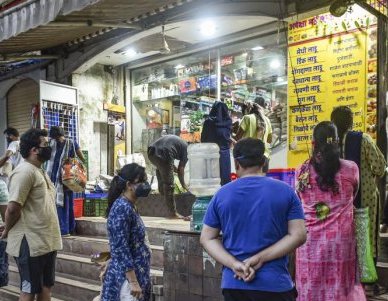Bharat Jhunjhunwala
The cycle of economic activity starts from production. Workers get salaries and use this money to buy goods from the market. Businesses then establish factories to supply to the market. The cycle can be written as production > wages > demand > investment. This cycle has got broken at present. Production has been stopped, workers are not getting salaries and there is no demand in the market. There are two points from where we can try to restart this cycle. One is to focus on restarting production. The government can reduce corporate taxes and defer payment of loans to encourage businesses to restart production as has been demanded by big business organisations like the Confederation of Indian Industries and Assocham.
The problem here is that the number of workers employed by big businesses is less. Accordingly, less money will flow to workers and the demand generated in the economy will be less. This effort will be like the cricket ball sent into a sixer but falling into a mud pool. It will not bounce. Reliefs to big businesses will only lead to an increase in their inventories.
The second point of intervention to try and restart the economy would be to focus on wages in the cycle of production > wages > demand > investment. The government can put purchasing power in the hands of the people so that they buy cloth, paper and shoes. Rest assured, the businesses will start manufacturing these goods on their own—reliefs or not—once they see the demand. However, this will still not be sufficient to restart the economy.
Let us say, the government pays money to the people and demand is generated in the market. Now, let us say, this demand is fulfilled by big businesses. The cloth will be sold but that is where the cycle will come to a halt because few wages are paid by the big businesses that produced the cloth. The second cycle of placing money in the hands of the people will not take place. The cricket ball will be brought back only to be shot again into the mud pool.
The results will be altogether different if the same demand is met by small businesses. Let us say, the government pays money to the people and demand is generated in the market. The cloth manufactured by small businesses will be sold as previously but in the process more wages will be paid. The workers receiving the wages will come back to the market with this money. The cricket ball will be brought back and shot within the field for two runs, come back and be shot again and again. The economy will rev up slowly but this will sustain. More importantly, the cars, bikes and TVs produced by big businesses will also start to sell. Ayurveda doctors sometimes starve a patient for a while to revive the appetite. Similarly, the government will assist the big businesses by starving them of relief.
So how does the government generate demand in the market? The first route is to increase government investment in electricity generation, highways and other infrastructure. This will not succeed because the number of trucks plying on the highways is less. Also, most such investment is capital intensive and does not employ large numbers of workers. Hence demand will not be generated in the market in the next cycle. The second route is to give relief in corporate tax and defer loan payments by big businesses. Once again, this will not help restart production because they pay less wages. The third route is to increase welfare expenditures such as the provision of 5 kg free grains and advance payment of pensions to senior citizens. This is in the right direction but still does not create additional demand. Such measures only advance in future demand to present.
The question then is this: how to place purchasing power in the hands of the people? President Trump has issued cheques of $ 1,000, or about Rs 75,000 to all the citizens of the country to generate demand. We have about 30 crore households. A suggestion is that the government pays `2,000 per month as Universal Basic Income (UBI) to each household for the next three months. This will require about Rs 2 lakh crore. The government should allow fiscal deficit to increase, borrow and make this expenditure.
Many economists hold that fiscal deficit can be allowed to increase to 10 percent of GDP in times of crisis such as at present. Our fiscal deficit was about 4 percent in the last year. We have leeway of borrowing an additional 6 percent or about Rs 12 lakh crore, since our GDP is about Rs 200 lakh crore. I reckon that there will be a reduction in the tax revenues of the Union Government by 50 percent for six months, leading to a loss of revenue of about Rs 3 lakh crore. That would still leave the scope of using `9 lakh crore for distribution to the people.
The government can start with borrowing Rs 2 lakh crore and distributing this to the 30 crore households. If required, more can be borrowed to extend the period of payment. These payments will generate demand for cloth, paper and shoes in the market and restart the economy—provided the demand is met by small industries. For, in that case, more wages will be paid and a fresh cycle of wages-demand-investment-production will be initiated. The danger is that if the same demand is fulfilled by large businesses, then few wages will be paid and the cricket ball will once again fall into the mud pool.
Another way to raise the money for the UBIS is to double the excise duty collected by the Union Government on fuel oil. The government is collecting about Rs 4 lakh crore per year from this source. This additional burden will fall disproportionally on the large businesses who undertake more interstate transport; and the rich who consume more energy. The need is to increase demand by increasing welfare payments and simultaneously providing relief to small industries.
There is no doubt that the government will allow fiscal deficit to increase, borrow heavily and make expenditures. The danger is that this effort will fall flat if this money is used for giving tax reliefs to large businesses because few wages will be paid and the next cycle of production > wages > demand > investment will not be established. Fiscal deficit is permissible only if the money sets such a fortuitous cycle in motion.
The writer is former Professor of Economics, IIM Bangalore.






































